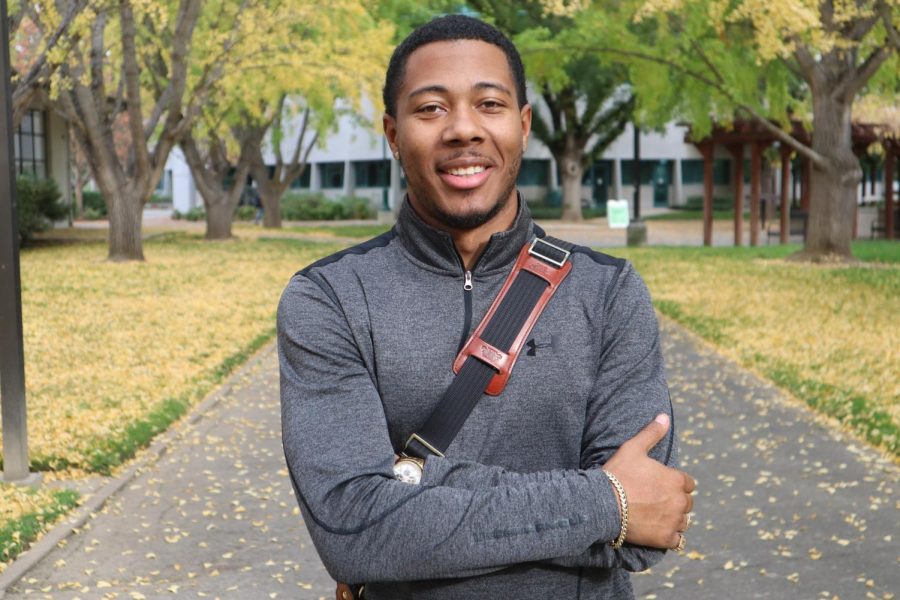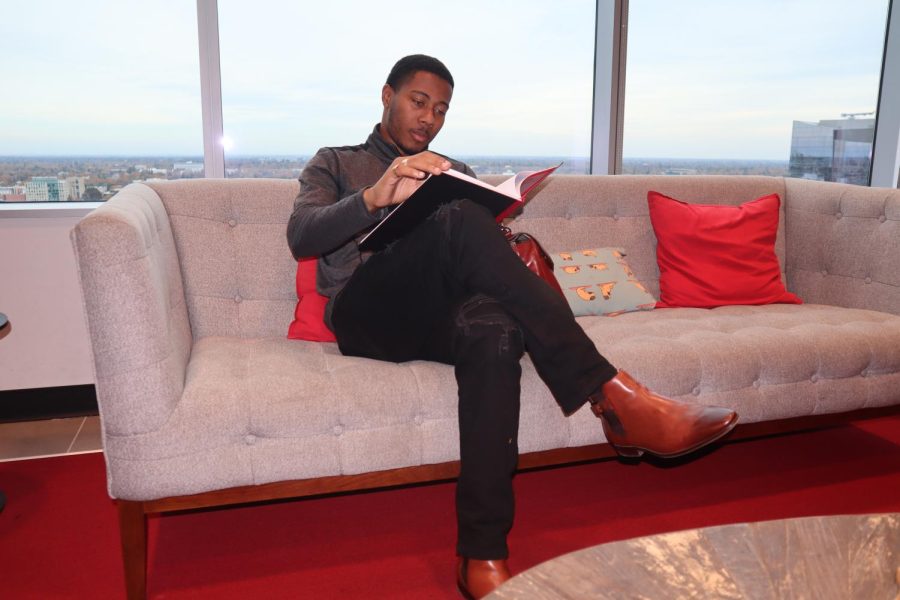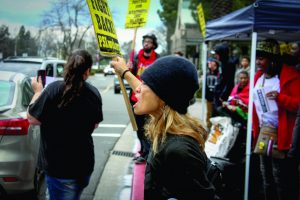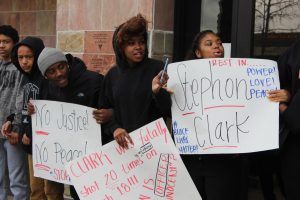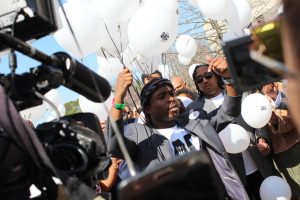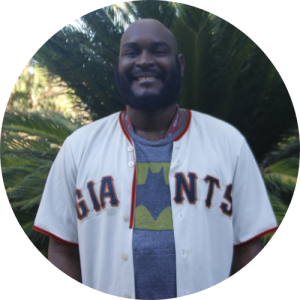Black Alumni president reminisces on early life and activism at Sac State
Khalil Ferguson talks about Co-founding Black Student Union, activism and the Black Alumni Chapter
Black Alumni President Khalil Ferguson at Sacramento State on Nov. 9 2021. Ferguson Is one of the co-founders of Black Student Union from its reactivation in 2015, and he engages in local policymaking to this day.
February 2, 2022
In March 2019, Sacramento’s district attorney Anne Marie Schubert announced on live television that the city will not prosecute the officers involved in the killing of Stephon Clark, a 22-year-old unarmed Black man.
Clark was killed on March 18, 2018 in his grandmother’s backyard. Following the decision, 11 students from Sacramento State, including Khalil Ferguson, and one student from UC Davis who wished to remain unnamed started a sit-in that shut down the Arden Fair shopping mall and lasted until the following morning.
The week following the district attorney’s decision was monumental, according to Ferguson.
“It was surreal,” Ferguson said. “I don’t think I understood the impact that [it] would have and the legacy that it would leave in Sacramento. So now folks are still referencing that, and it seemed like the right thing to do.”
Ferguson’s journey at Sac State began in fall 2012, at the age of 16. He majored in government and international relations.
Ferguson grew up under the Nation of Islam and went to a private school in Oakland called Your Black Muslim Bakery in a complex called Elijah’s Educational Center. This school allowed him to skip the first grade because he was considered advanced, according to Ferguson.
In his time at Sac State, Ferguson was one of the founding members of the Black Student Union reactivation in 2015. He still goes to BSU events and offers his support to this day. Ferguson graduated in the class of 2018 and led several student protests in 2019.
Ferguson now serves as the president of the Black Alumni Chapter, where he advocates and supports Black students.
Black Student Union
In 2015, Ferguson, along with Antoine Johnson, Isaiah Alexander and Janay Ezekwe formed Black Student Union at Sac State.
“The idea behind it was at the time, the environment was that there were a bunch of Black students, Black men and women being killed by the police weekly,” Ferguson said. “It felt like monthly, it just felt like it was occurring so rapidly.”
Ferguson said it became more of an emotional time for Black students, and they realized that it wasn’t the time for a rally. The rally was for political action demands to be presented, which at the time, they did not have.
“You couldn’t be mad at students who were having to face repercussions of a Black individual dying at the hands of the police every month,” Ferguson said. ”We realize that there was the need for a Black community to be solidified.”
The creation of BSU stemmed from the lack of representation of Black students in conversations with administration, the president’s cabinet, and faculty and staff, he said. As a result, Black students were not being heard regarding what they wanted and how they were feeling, according to him.
Ferguson said the actual process of forming BSU wasn’t hard because he had experience filing paperwork for his fraternity Iota Phi Theta, which is the fifth-largest Black fraternity in the country, and has a chapter based in Sac State. He also got the adviser that they knew they needed, Jerry Blake. “We knew that he would say yes to a BSU as an umbrella kind of consortium organization to help represent every Black student and every Black organization on campus,” Ferguson said.
Blake is the current senior lead for retention and graduation for the Male Empowerment Collaborative Education Opportunity Program, served as the adviser for BSU during its foundation in 2015. He said he believes that Ferguson is personable and knows how to motivate people the right way.
“I think he’s talented, and very smart. And that’s without going into his academics,” Blake said. “I like the fact that he’s currently under the leadership of the Black Alumni Chapter… to have someone like Khalil to keep that going, is very much appreciated.”
Activism
Following the sit-in at Arden Mall Ferguson was among 84 people detained in the Fab 40’s neighborhood in Sacramento for protesting.
Two days later, Ferguson said that students from local middle and high schools, Sacramento City College and Sac State had to plan what was going to happen and how they were going to protect themselves, since they were going to be marching in the street, where they planned to meet up and make their demands. The planning had to be done precisely to ensure that the protest was effective.
“We had small power dynamics like different students from different hoods are going to be there and how we’re going to mitigate that,” Ferguson said. “That was something that had to be handled during the walk, but it was impactful.”
Ferguson said he knew it was impactful and powerful because it was all in support of AB-392, a bill proposed by the California legislature that would change the definition of justifiable homicide for all police cases moving forward.
Long-time professor of 21 years at Sac State Patrick Cannon had Khalil for three courses in 2018. Cannon said the three characteristics he likes about Ferguson is that he is intellectually curious, assiduous and he asked great questions.
Cannon said Ferguson announced in his African Politics class that he would be leaving to go protest the night he got detained.
“As someone who teaches political science, I was delighted,” said Cannon. “Around that time, we had finished reading Franz Fanon, who wrote a lot about criticizing colonialism, criticizing white supremacy, criticizing institutions that perpetuate colonialism and supremacy and racism.
Cannon said he wrote about how to create autonomy and independence and thought to have Ferguson involved.
“Like not only being engaged in the course material but then participating, standing up to police violence, the systemic racism of the Sacramento Police Department. I just thought that that was a terrific thing to witness for a political science professor to witness.”
Ferguson said he doesn’t engage in activism as often anymore because he’s graduated to the policy realm.
“I think you’ll realize that a lot of activists go from being primarily in the streets to doing activism and policy, because you can’t have activism without using that power to influence the change of law,” said Ferguson. “That’s really where the power resides, and what the law says what the police can and cannot get away with is what the law allows us to do.”
Ferguson said police are afforded some legal protection because of their political influence to such an extent that they can do whatever they like.
“So changing the law doesn’t always provide much reassurance or much progress,” Ferguson said. But still it provides some, at least legal recourse in the civil capacity which means you can sue for what they violated with regard to your constitutional rights, or they have to act in a certain manner.”
Black Alumni Chapter President
Ferguson became president of the Black Alumni Chapter after former president Jackie Morris-Henderson died of cancer. After a two-year gap, he said he had no intention of running for president until the board members reached out to him and encouraged him to run.
Ferguson says one of the reasons he ran for president of BAC was because Morris-Henderson was a mentor to him. He said she would gather the Black student leaders and help them develop the theme for the year every summer.
“Also, seeing some of the shortcomings with regards to the relationship to current students in my generation of graduates that needed to be connected and the bridge needs to be gapped,” he said.
As the president of BAC, Ferguson said he’s trying to connect recent graduates to older alumni and to the students while offering resources to help them succeed.
“Either getting letters of rec, getting internships, finding potential jobs, really networking with folks who look like you in your network and really care about you as a Black student,” Ferguson said about his plans for BAC. “That’s the biggest benefit I feel like I can offer on top of the scholarships to students who are entering the job force upon graduation.”
Black Alumni Chapter events coordinator Kenda Green has been very much integral to helping Ferguson plan events he said. Green said being an events officer is basically a second hand to the president of BAC.
Green helped plan the Afrikan Black Coalition Conference that was held as an hybrid conference for BSU on Martin Luther King Jr weekend. Green said Ferguson, who is also roommate, honored her at the conference.
“He awarded me for being there for him,” said Green. “He has all these accolades on the wall that we live in, nothing’s in my name, because he is the front runner of a lot of stuff. But, he knows that I’ve been there helping him, so he kept it a secret from me. Everybody knew this big plan and so in front of this conference. He gave me an award. It was a special moment for me.”
According to Ferguson, students are encouraged to join the BAC and to give back. Since Ferguson is involved in policy making, he said he uses his political network to get certificate recognition from various office assembly members.
“They’ll give those awards to students who have shown just commitment to organizing and leading Black students in the community,” Ferguson said. “I’m actually having the best time right now, planning awards, to give the students just to recognize their leadership.”

Reflection
What inspires Ferguson today is that he has the political education he has gotten from reading the words of African and Black American intellectual minds.
“But really now the inspiration is that seeing myself and my peers are the next Emerging Leaders of Black political thought of Black political organizers and seeing us be successful,” Ferguson said. “We have the opportunity to be the leaders of our generation and inspire our peers and the generations below us”.
Co-founding BSU impacted Ferguson because it made him a student leader at Sac State and beyond the university into the Sacramento community. Ferguson said it has promoted him as a community leader on campus at Sac State with administration and the president’s cabinet, but that liquidity has transcended into the Sacramento community and his own studies.
”Now I have a relationship with community members throughout the city as well,” Ferguson said. “And can only be one of the connecting points between multiple areas of the community such as a policy community, some of the cultural community in South Sac, and then academia at Sac State as well.”






























































































































